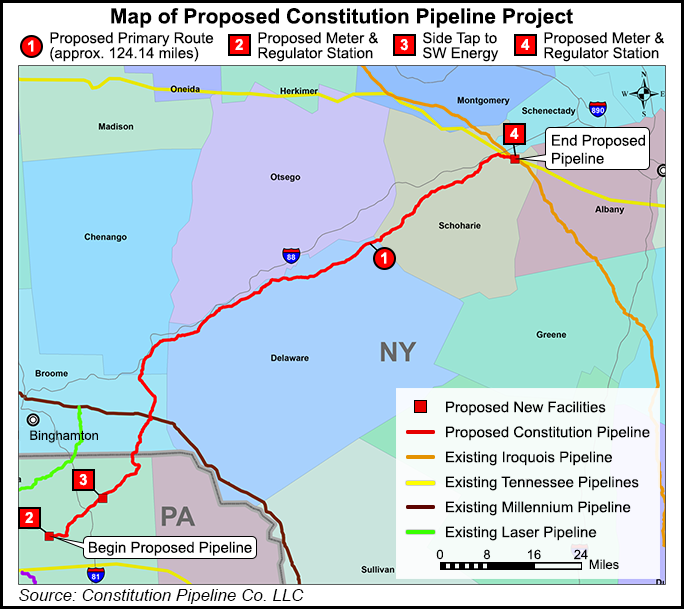Regulatory | Infrastructure | NGI All News Access
Constitution Gets a Lift as FERC Moves to Reconsider New York Authority
The beleaguered Constitution Pipeline is getting another chance as FERC indicated that it may rehear a challenge to the New York State Department of Environmental Conservation (DEC), which denied the water quality certification (WQC) and brought the natural gas project to a halt three years ago.

The Federal Energy Regulatory Commission wants the U.S. Court of Appeals for the District of Columbia (DC) to allow it to reconsider a decision made by FERC last year. At the time, the Commission refused to waive New York’s regulatory authority, finding that the DEC did not fail to act on Constitution’s WQC within the one-year timeframe required by the Clean Water Act (CWA), as the project’s sponsors had argued. Constitution sponsors appealed FERC’s decision to the DC Circuit, but FERC wants the case remanded after the court ruled last month on an unrelated hydropower project that addressed similar issues.
At FERC’s request, Constitution’s appeal had been put on hold pending the outcome of the hydropower case, Hoopa Valley Tribe v. FERC et al, No. 14-1271. Constitution’s sponsors had been pushing FERC to reconsider last year’s decision. Earlier this month, Cabot Oil & Gas Corp. CEO Dan Dinges sent a letter to FERC Chairman Neil Chatterjee urging the Commission to act on Constitution, writing that “both policy and legal arguments now appear to favor timely action” following the Hoopa Valley ruling.
Constitution in 2014 received a FERC certificate authorizing construction and operation. But sponsors have battled the DEC since 2016, when after nearly three years of regulatory review, the WQC was denied. The project sponsors had filed for a WQC in August 2013, but the application was withdrawn and resubmitted twice, which DEC argued reset the one-year deadline it had to make a decision each time. FERC agreed last year and refused to waive the state’s regulatory authority.
In the Hoopa Valley case, the DC Circuit ruled that FERC should proceed with a review of the Klamath Hydroelectric Project, a 2004 proposal by electric utility PacifiCorp to build a series of dams along the Klamath River in California and Oregon. The court held that withdrawing and resubmitting WQC applications “does not trigger new statutory periods of review.” A three-judge panel ruled that, when an applicant and a state explicitly agree to delay a WQC, states defy the CWA’s requirement for action within a reasonable period of time.
Dinges said in his letter that given the Hoopa Valley ruling, “the gamesmanship of the state of New York has never been more legally suspect.” He also stressed during a year-end earnings call last week that Cabot has not given up on Constitution.
FERC’s request to remand the case comes after multiple defeats for Constitution, including those before the U.S. Court of Appeals for the Second Circuit and the U.S. Supreme Court. It also comes as utilities in downstate New York and New England have either imposed moratoriums on new gas customers or signaled that similar actions are ahead as parts of the region face supply shortages.
The 124-mile Constitution Pipeline would carry 650 MMcf/d of Appalachian gas from Susquehanna County, PA, to an interconnect with the Iroquois Gas Transmission and Tennessee Gas Pipeline systems in Schoharie County, NY. The project is backed by Williams, Cabot, Piedmont Natural Gas and WGL Holdings Inc.
© 2024 Natural Gas Intelligence. All rights reserved.
ISSN © 1532-1231 | ISSN © 2577-9877 |
